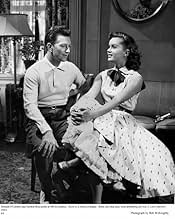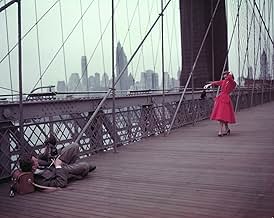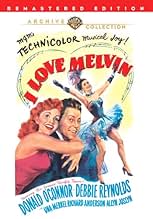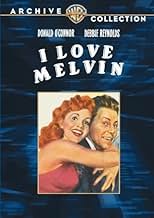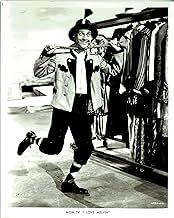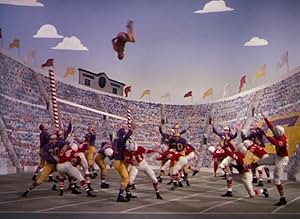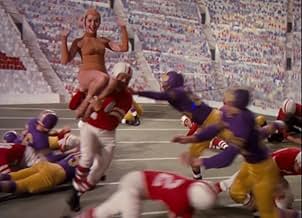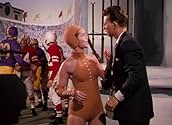Adicionar um enredo no seu idiomaMelvin, a photographer for "Look" magazine, meets Judy and wants to marry her. Her father is against that and as a last resort, Melvin promises to get Judy's photo on the cover of the next i... Ler tudoMelvin, a photographer for "Look" magazine, meets Judy and wants to marry her. Her father is against that and as a last resort, Melvin promises to get Judy's photo on the cover of the next issue, a task easier said than done.Melvin, a photographer for "Look" magazine, meets Judy and wants to marry her. Her father is against that and as a last resort, Melvin promises to get Judy's photo on the cover of the next issue, a task easier said than done.
- Direção
- Roteiristas
- Artistas
- Mrs. Bernstein
- (não creditado)
- Police Captain
- (não creditado)
- Chorus Boy
- (não creditado)
- Minor Role
- (não creditado)
- Meek Man
- (não creditado)
- Look Magazine Board of Directors
- (não creditado)
- Fat Man on Bench
- (não creditado)
- Acrobatic Cheerleader
- (não creditado)
- Direção
- Roteiristas
- Elenco e equipe completos
- Produção, bilheteria e muito mais no IMDbPro
Avaliações em destaque
Overall I don't know why people are saying these musical numbers in this film aren't as good as 'Singin' in the Rain.' In my opinion, while the melodies aren't quite as memorable, the way the music is constructed(harmonies etc) is far superior to that of it's more famous cousin.
There are plenty of strange moments throughout the movie, however. So strange that they create unexpected humour. For one, Donald's solo dance number while cleaning the studio only made sense after I read about it. When watching it, I couldn't understand what was going on. Furthermore, the football scene with Debbie in it was so bizarre that you had to laugh. I think this unintended humour made things a little better, but knowing it was unintended put a little downer on things.
What the story does well is create an emotional investment in the characters - I felt for Debbie's character as I knew how much she wanted to be on the cover of the magazine. I also felt for Donald's character as he tried to set things right. However that's about the only thing I liked about the plot.
Debbie and Donald are both great here - Donald already well established, and Debbie trying to make her break since Singin in the Rain. It's obvious these two have more chemistry than the Reynolds/Kelly combination, probably due to age differences and things(Debbie would have been around 20 and Donald around 27, whereas Gene was already 40)
While the film is short, the ending seemed extremely rushed to me, and could have benefitted from a few extra minutes of footage. What happened afterwards? A lot of unanswered questions were left. Furthermore, the very end shot of Debbie frantically fondling Donald didn't leave a great taste to end. Something more calm would have made the ending seem less frantic and rushed.
Also, there are plenty of script moments which seem very strange to a modern viewer(this is all part of historical relativism I assume) - such as a random man approaching Debbie and asking her if he could walk her places, which she just calmly responds 'No, thank you.' whereas today, this would seem extremely bizarre. Similarly, the 50's housewife persona is capitalised here - e.g. 'I'll cook just like my mother taught me'(Debbie) contrasting with the more dominant male persona(her father) is very apparent here. There is nothing necessarily wrong with this, it's just a point that I noticed.
Some of the script was extremely unconvincing - a mere 30 minutes in, Donald confesses his love for her in a car, and then says 'if you marry this other boy, I'll be very frank, I'll kill myself.' I have to commend Donald for selling such an unconvincing piece of dialogue barely a third of the way through.
It has been said that both Debbie and Donald did not enjoy the process of making this film, and it's easy to see that the plot, narrative and script were not as well thought out as it could have been. However, the talent of the two main actors show how much of a triple threat they both were.
Overall, this film has some very bizarre moments, with a few plot holes, unconvincing scriptwriting and a rushed conclusion. To save it, the talent of the two main actors plus the great musical numbers and the emotional story help out.
Debbie is perfect as both great movie star and girl next door. Her Broadway performance as a football is a riot. Equally good is Donald O'Connor as her lover and aspiring photographer. His roller-skate sequence is brilliant, as is a dance sequence in which he travels the world and plays numerous characters (again thanks to Gibbons). There is great support from Allyn Joslyn, as Debbie's exasperated father, and from Jim Backus as a crabby photographer. And the little girl has a good song too.
The score is jazzy and upbeat, and it's great to see the real Central Park and other New York locations, shot in gorgeous technicolor. I think this terrific musical is very under-rated.
It's also the kind of movie dream factory MGM specialized in, a chance for their younger performers to show their stuff. But catch oldster Jim Backus as O'Connor's boss. His array of comedic expressions are a real hoot. The music may be forgettable, but the dancing is infectious. Thanks to the kids' charm and sparkle, plus fast-moving direction, the movie's an unheralded little gem. Then too, if you like this musical, catch up with The Affairs of Dobie Gillis (1953). It's with Reynolds and Bobby Van, and is just as sparkling as this companion sleeper.
Você sabia?
- CuriosidadesDonald O'Connor's dance number on roller skates precedes by two years the better remembered sequence with Gene Kelly in Dançando nas Nuvens (1955).
- Citações
Judy: They want me to marry Harry Flack!
Melvin: Judy, you can't! I-I love you, Judy!
Judy: Shh... Melvin...
Melvin: You're not gonna do it, are you?
Judy: Well, you see...
Melvin: Because if you do it, I'll be very frank about this, Judy. If you do it, I'll kill myself!
Judy: Melvin! Stop it!
Melvin: I mean it! Judy, you know how I feel! I'd do anything for you! I'd rob a bank, I'd take a rocket to the moon, anything! Just ask me!
Judy: Put me on the cover! My picture, on the cover of the magazine!
Melvin: Judy, I said I'd kill myself or take a rocket to the moon, but don't ask the impossible!
- Cenas durante ou pós-créditosThe dream sequence during opening credits shows Debbie Reynolds in a dressing room. She breaks the fourth wall by looking at the camera and then writing the title with lipstick on a mirror.
- ConexõesFeatured in Frank's Place: I.O.U. (1987)
Principais escolhas
- How long is I Love Melvin?Fornecido pela Alexa
Detalhes
- Data de lançamento
- País de origem
- Idioma
- Também conhecido como
- É Desse Que Eu Gosto
- Locações de filme
- Empresa de produção
- Consulte mais créditos da empresa na IMDbPro
Bilheteria
- Orçamento
- US$ 1.300.000 (estimativa)
- Tempo de duração1 hora 17 minutos
- Proporção
- 1.37 : 1
Contribua para esta página




